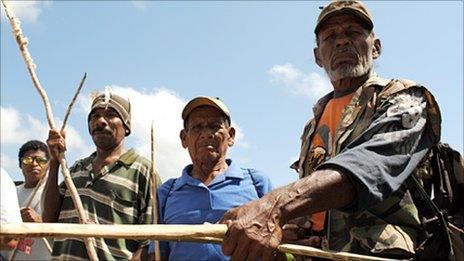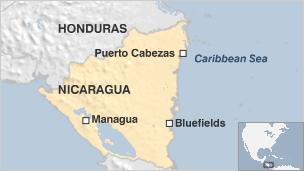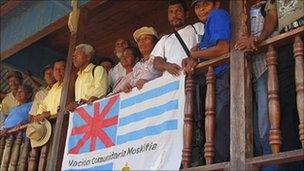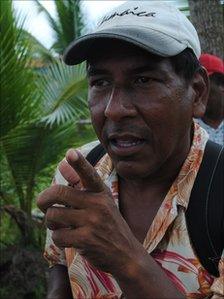Drugs dilemma on Nicaragua's Mosquito coast
- Published

Miskito separatists say they have been marginalised by the central government
Clutching a sharpened wooden spear and dressed in the tattered remains of his military fatigues, Ismael Zamora insists he is as ready as ever for combat.
Mr Zamora, a former counter-revolutionary guerrilla fighter, is part of an indigenous separatist movement on Nicaragua's Caribbean coast.
While the homemade spear Mr Zamora carries today is not as formidable as the AK-47 and RPG-7 rocket launcher he lugged during the indigenous uprising against the Sandinista government in the 1980s, Mr Zamora insists it serves a purpose.
"This is to defend my rights and my land," says Mr Zamora, a fit-looking 63-year-old, flanked by a dozen other Miskito ex-combatants armed with similar makeshift weaponry.

The symbolic show of force is more quaint than fearsome but it demonstrates the indigenous communities' sense of vulnerability to old and emerging threats.
As drug cartels become ever more active in Central America, there has been an influx of dirty money into impoverished communities along the Mosquito Coast.
Huge mansions, new 4x4s and plush boats show that some locals are already taking advantage of the narco dollars circulating in their region.
But for the communities as a whole, the drug gangs' activities have brought a rise in organised crime and drug addiction.
British links
The region has long felt vulnerable to outside interference.
For more than two centuries, the Miskito people allied themselves with Britain as they resisted Spanish colonial rule.
Their land, which stretched from what is now Honduras in the north along the present-day Nicaraguan coast, became a British protectorate.
The Moskitia territory was annexed by Nicaragua in 1894.
The Nicaraguan government does not recognise the renewed independence claims, nor does anyone else.
And even among local indigenous populations, the separatist movement does not seem to have fully taken hold. However, that has not tempered the separatists' enthusiasm.
The Council of Elders - the indigenous communities' traditional power structure - has revived the idea of re-establishing independence under the flag of the "Communitarian Nation of the Moskitia" as a way of tackling their problems by themselves.
The council has proposed a referendum later this year to ask indigenous communities whether they want to live under Nicaraguan law, or secede under the ancient "Supreme Law of the Moskitia."

The region is the poorest part of Nicaragua
Separatist leaders have sent letters to US Secretary of State Hillary Clinton and Queen Elizabeth II asking for support.
But with little prospect of outside backing, indigenous leaders say they might be forced to help themselves to the only means of funding available for their aspiring nation: narco dollars.
By this they mean the drugs money that moves illicitly through the communities, buying silent allegiances, or the drugs packages abandoned by fleeing smugglers or confiscated by the authorities.
"The economy of this region is a drug economy," said Oscar Hodgson, legal adviser to the Council of Elders and a separatist leader.
"We think that the drug money that gets confiscated here on the coast should stay here in the community," said Mr Hodgson.
"Good money can be used for bad things, but at the same time dirty money from drug-trafficking can be used for good things, if put in the hands of the Council of Elders," Mr Hodgson said.
For example, he said, funds could be used to build a new hospital or help rehabilitate Miskito youth hooked on drugs.
Mr Hodgson says the council has so far refused to take drugs money but will discuss the issue at their annual "great assembly" at the end of May.
White monster
Others seem less convinced, including Comandante Papaya, a former Miskito guerrilla leader turned Evangelical preacher.
"It's better to be poor with good character than to take drug money and try to do good things with it," he said.
And the authorities are clear on the issue.

Oscar Hodgson believes the time for change has come
Army spokesman Colonel Juan Ramon Morales says that just because the indigenous group identifies itself as separatist does not mean it is exempt from Nicaraguan law.
Col Morales downplays the threat posed by the separatists, but says any involvement in the illicit drug trade would be considered a serious infraction.
Even suggesting plans to employ narco-financing is a "rash" statement and "a virtual violation of established law", he says.
While the indigenous debate over drugs money continues, people here agree that marginalised communities are badly in need of development.
Twenty-one years after a 1990 disarmament accord ended the indigenous uprising, many former combatants - people in their 40s to 60s - say their patience has finally run out.
And the younger generation seems to share that frustration.
The separatists say the promises of state aid and financing never panned out, despite the government's insistence that progress is being made.
"We fought for a just cause, but then they took our weapons away and left us living like this," said ex-combatant Carlos Molina.
"Today the Sandinistas are living well, while we have been cast aside."
Still, indigenous leaders say change is born of crisis.
And some think the multiple problems of drugs, politics and poverty are part of a prophecy that culminates in the rebirth of the indigenous nation.
"The drugs have become a white monster that has enslaved us and exacerbated the crisis. But it's a crisis that will lead to a change of system," said Mr Hodgson.